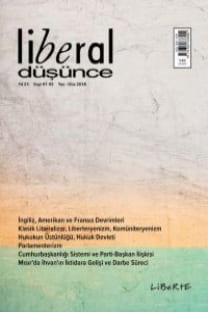Farabi’den İbn Haldun’a: Erken Dönem Müslüman Entelektüellerin Yazılarında Devlet Algısı
İslam Siyasi Düşüncesi, Farabi, Maverdi, Nizam-ül Mülk, Gazzali, İbn Taymiyye, İbn Haldun
From Farabi to Ibn Khaldun: The Perception of State in the Early Muslim Intellectual’s Writings
Islamic Political Thought, Farabi, Mawardi, Nizam al-Mulk, Ghazali, Ibn Taymiyyah, Ibn Khaldun,
___
- Al Ghazali (1980). Al Mustazhari (translation of Fadaih al-Batiniyah wa Fadail al-Mustazhiriyyah by Richard J. McCarthy)”, Twayne Publishers
- Al-Farabi, Abu Nasr and Tarkhan, Muhammad (1995). Tahsil al Sa'ada. (Attainment of Happiness) Ed. Ali- Abu Melehem. Beirut, 25-46
- Al-Mawardi, Abu al-Hasan (1996). Al-Ahkam as-Sultaniyyah The Laws of Islamic Governance. Trans. Asadullah Yate (London: Ta-Ha Publishers, 1996).
- Al-Mulk, Nizam (1960). The book of government: or, Rules for kings: the Siyāsat-nāma or Siyar al-mulūk. Yale University Press.
- Crone, Patricia (2014). Medieval Islamic political thought. Edinburgh University Press.
- Elo, Satu, and Kyngäs, Helvi (2008). "The qualitative content analysis process." Journal of advanced nursing 62.1: 107-115.
- Farabi, Abu Nasr & Walzer, Richard (1985). Al-Farabi on the Perfect State: Abu Nasr al-Farabi's Mabadi Ara Ahl al-Madina al-Fadila: A Revised Text with Introduction, Translation, and Commentary. Trans., intro. notes, and commentary by Richard Walzer. Oxford: Clarendon Press/Oxford University Press.
- Ibn Taymiyyah, T. (2000). “The Political Shariyah on Reforming the Ruler (translated by Dr Umar Farrukh)”, Dar ul Fiqh UK
- Julien, Heidi (2008). Content Analysis. In L. M. Given (Ed.), The SAGE Encyclopedia of Qualitative Research Methods: Volumes 1 & 2 (pp. 120-121). Thousand Oaks: SAGE Publications.
- Kamaruddin, Rusli (2004). “Politics in the Works of Al-Ghazzali”, Intellectual Discourse, Volume: 12, No: 2, Page; 113-136
- Ibn Khaldun (1958). The Muqaddimah. An Introduction to History, Translated by Franz Rosenthal, London and Henley; Routledge and Kegan Paul
- Krippendorff, Klaus (2004). Content analysis: An introduction to its methodology (2nd ed.). Thousand Oaks, CA: Sage.
- Leamen, Oliver (1987). Continuity in Islamic Political Philosophy: The Role of Myth, Bulletin (British Society for Middle Eastern Studies), Vol. 14, No. 2 (1987), pp. 147-155
- McKee, Alan (2001). A beginner’s guide to textual analysis. Metro Magazine, no. 127 pp. 138-149.
- RAHMAN, HAFIJUR (2020). From Jamal Uddin Afghani to Rachid Al-Ghannouchi: The approach of contemporary Muslim Intellectuals to the concept of state. CenRaPS Journal of Social Science, 2 (1), 41-57, doi.org/10.5281/zenodo.3661081
- Rosenthal, Erwin I.J. (1958). Political Thought in Medieval Islam An Introductory Outline, Cambridge University Press.
- Rudolph, Ulrich (2012) “Abû Nasr al-Fârâbî”, in Philosophie in der islamischen Welt, Volume 1: 8.–10. Jahrhundert, (Grundriss der Geschichte der Philosophie), Ulrich Rudolph (ed.) with Renate Würsch, Basel: Schwabe, pp. 363–457.
- Suleimenov, P., Kuanyshkyzy, I., Sandykbayeva, U., Kussainova, K.T. and Smagulova, K. (2017). “The Doctrine of the Virtuous City of Abu Nasr al-Farabi: a Philosophical Analysis”, Man of India, 97 (23) Part 3: 473-484
- The Noble Quran (2016), retrieved from; https://quran.com/4/58-59 (last accesed: 27.05.2020)
- ISSN: 1300-8781
- Başlangıç: 1996
- Yayıncı: Liberte Yayınları
Fikri Mülkiyetin Ürün İnovasyonu ve Pazar Şekillenmesi Üzerindeki Yıkıcı Etkileri
Farabi’den İbn Haldun’a: Erken Dönem Müslüman Entelektüellerin Yazılarında Devlet Algısı
Barış Çalışmalarında Sosyal Temsiller Kuramı: Gruplararası Farklılıklar ve Bağlamsal Etkiler
Organizasyonel Sessizlik, Düşüş ve Ölüm
Bir Türk Siyaseti Okuma Biçimi Olarak Gelenekçi Yaklaşım
Kamusal Alanı Dijitalleşme Çerçevesinde Yeniden Okumak
Kırsalda Katılım Bankacılığı Algısı: Oltu Örneği
Irkçılığın Avrupa’daki Gelişimi ve Uluslararası Hukuka Etkisi: James Lorımer Örneğİ
Nicolai Hartmann’ın Yeni Ontoloji Perspektifinden Ahlâkî Özgürlük Yorumu ve Kant Eleştirisi
